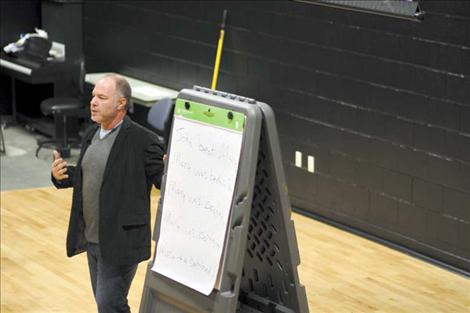Activist speaks about domestic violence
Hey savvy news reader! Thanks for choosing local.
You are now reading
1 of 3 free articles.
POLSON — Jackson Katz, an internationally known anti-sexism activist, educator, author, speaker, filmmaker and cultural theorist, paid a visit to the Mission Valley last week.
Having written several books and given hundreds of speeches to high school and college campuses around the world on the subject of gender violence, Katz’s approach involves a new way of preventing this kind of violence: he talks to the men.
Domestic Violence Education Services Executive Director Jenifer Blumberg said the initiative to engage men in the discussion has always been a goal of the DOVES organization, but for a long time it was a subject she wouldn’t broach.
“I wouldn’t touch it,” Blumberg said. “It’s too hard; it’s too big of a deal.”
After several years working in and around the Flathead Reservation, Blumberg said she felt comfortable enough to start to open dialogue on the subject. Hoping to stop the problem at its source, she decided to work within the community rather than through law enforcement. This, of course, involved talking to the community, and the idea of engaging men was an important part of the process.
To do this, she decided to put together a men’s leadership breakfast during which male community leaders from around the reservation could listen to Katz’s presentation and begin openly discussing a subject that Katz said, “is pushed into the shadowy corner of the room and simply not talked about.”
Katz explained that a large amount of his work deals with reframing issues that have historically been framed as “women’s issues that good men help out with,” and casting them in a different light, saying, “These are mens and women’s issues, but certainly, men have an important role to play.”
Katz said the role he plays is one of prevention — not advocacy, victim services or law enforcement. As the vast majority of sexual and domestic violence is preventable, the question becomes, “How?”
“How do you get men to engage in this stuff?” Katz explained. “How do you get men who are in positions of influence to start making it clear to men around them and men younger than them that treating women with disrespect — physically, sexually, or any way— is unacceptable, not just because it’s illegal, but because it’s unacceptable? Women have been leading in this effort for decades ... it’s time more men joined them. That’s the message.”
To convey that message and show the role men play in gender violence, Katz drew a simple sentence on a white board for the audience. The sentence read, “John beat Mary.” Next, he changed the message to the passive voice, “Mary was beaten by John.” The next two steps in the progression were, “Mary was beaten,” followed by, “Mary is battered.” Finally, the final sentence becomes, “Mary is a battered woman.”
As Katz pointed out, both John and the fact that he is the aggressor who beat Mary is no longer a part of the discussion.
“As I’m doing with the exercise with language, focusing on what women do or don’t do to put themselves at harm or risk avoids the central question, which is ‘Why are they at risk, who is responsible for the risk, and what can we as men do about that?’ because, obviously, men are the overwhelming majority of the perpetrators.”
Even so, Katz said his broader message is not geared toward telling abusive men not to be violent. Of course, that is a part of the message, but the broader message is to the bystanders who do not rape or abuse women and children, but stand idly by while others make sexist remarks or have sexist views. According to Katz, this behavior helps sustain a culture where men’s violence against women still exists.
“The thing that men who are abusive have in common is not their job or what they’re trained to do,” Katz said. “Instead, it’s that they’re living in this culture and learning from it as it teaches them to be a man.”
After 33 years as an activist, Katz says he’s seen progress and that many more men are speaking out against domestic violence, but it’s a long road ahead.
“We have a long way to go, but on the ground there’s actually people, and it’s still a tiny fraction – I have to emphasize it’s a tiny fraction of men as compared to the scope problem – but there’s no question that over the last several decades there’s been a shift. There’s a long way to go, but it’s not like it was when I was a young guy,” he said.
Bevra Jacobson, program manager for the Confederated Salish and Kootenai Tribes Victim Assistance Program, was in attendance for Katz’s second speech of the day at Salish Kootenai College and said Blumberg did a lot of work to get people to attend.
“It’s an important message to other men out there that they need to step up. We need their help to end this,” she said.
“Even if a few men change their minds, I think that’s progress,” Blumberg said.
“It’s like Jackson Katz said, ‘This isn’t a men’s issue or a woman’s issue; it’s an issue for all of us.’”
















